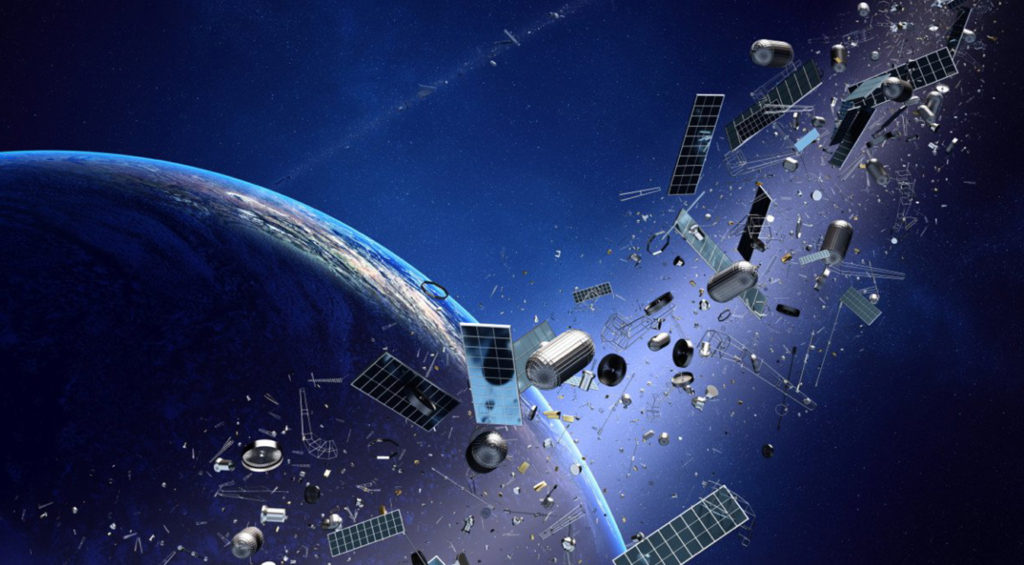|
Getting your Trinity Audio player ready...
|
A coalition of space experts is urging governments and space sector operators worldwide to adopt new guidelines to address the risks of space debris. The Space Safety Coalition, which comprises 27 parties including satellite communications firm Inmarsat, recommends adopting best practices for sustainable space operations, including a “rules of the road” guidebook for maneuvering spacecraft to avoid collisions that generate space junk.
The coalition’s move comes as more satellites are launched into space, leading to concerns over the burgeoning number of objects in orbit. According to a 2022 report from Inmarsat and AstroAnalytica, over 10,000 tons of satellite and rocket debris currently orbit Earth, with the figure set to increase as humanity’s exploration of space expands.
The European Space Agency estimates there are currently 36,500 objects larger than 10 centimeters in Earth orbit, as well as further 130 million objects between 1 millimeter and 1 centimeter wide. The agency notes that such debris moves at around 17,500 mph (28,200 kph), or roughly 10 times faster than a handgun bullet.
Satellites in orbit are particularly at risk from space junk collisions, which can generate even more debris and heighten the risk of further collisions. Recent events involving the International Space Station (ISS) have highlighted the potential danger posed by space debris.
In 2021, a Russian anti-satellite missile test destroyed a defunct satellite and created a fragment of space junk, which forced the ISS to take evasive action in October 2022. The station was also buzzed by space junk in November 2021, prompting astronauts to take refuge in a transport spacecraft.
Alongside the “rules of the road” guidebook, the Space Safety Coalition guidelines include best practices for space operators such as technical recommendations and operating procedures, and encourage the use of sustainable practices during satellite launches, such as reusable launch vehicles and alternative fuels.
The guidelines also suggest incorporating sustainability into future satellite design and technology, including propulsion systems that prevent gas releases into the atmosphere, in-space inspections and refueling, and improved disposal options for spacecraft at the end of their operational lives.
Inmarsat CEO Rajeev Suri commented on the importance of the coalition’s guidelines in establishing international best practices to protect the space environment. He called for real action to be taken urgently, as “the clock is ticking.” Suri also urged national regulators to use their market access powers to ensure satellite operators adhere to best practices outlined by the coalition and beyond.
The issue of space debris has been a growing concern among space experts and scientists for several years. With more satellites and rockets being launched into space, the risk of collisions and generating more space junk has increased.
The new guidelines from the Space Safety Coalition are an important step toward addressing this issue. By promoting best practices and guidelines, the coalition hopes to establish international standards for sustainable space operations.
Inmarsat CEO Rajeev Suri emphasized the urgency of taking action, saying that “the clock is ticking.” The issue of space debris is not one that can be ignored, as recent events have demonstrated potential dangers.
The report from Inmarsat and AstroAnalytica found that more than 10,000 tons of satellite and rocket objects are currently in orbit around Earth, and this number could increase dramatically as humanity’s exploration of space continues. The European Space Agency estimates that there are currently 36,500 objects in Earth orbit more than 4 inches in diameter and further 130 million objects between 1 millimeter and 1 centimeter wide.
The risks of space debris are not just theoretical. The International Space Station has already had to take evasive action to avoid collisions with space junk, and astronauts have been forced to shelter in a transport spacecraft due to the presence of debris.
The guidelines from the Space Safety Coalition offer several best practices for space operators, including the sharing of information between spacecraft owners and operators and the prioritization of sustainable practices during satellite launches. These guidelines also encourage the use of propulsion systems that prevent gases from being released into the atmosphere and the development of more sustainable technologies.
The Space Safety Coalition has urged governments and space sector operators to adopt these guidelines to help ensure the sustainability of space operations and minimize the risk of collisions and space debris. By working together, the international community can help protect the space environment for future generations.
